Case Study: Ethical Issues in a Cholera Outbreak - HLSC220 Ethics
VerifiedAdded on 2023/06/12
|9
|2281
|464
Case Study
AI Summary
This case study examines the ethical issues surrounding a cholera outbreak and the denial of treatment to a student, Amos, due to his residential status. It analyzes the situation in light of human dignity, human rights, the Australian Code of Ethics for nurses, the Australian Nursing Professional Code of Conduct, and core ethical principles such as non-maleficence, justice, autonomy, and beneficence. The analysis reveals violations of these principles and codes, highlighting the failure to provide equitable and timely healthcare. Recommendations are made for governments and healthcare practitioners to ensure equitable resource allocation, respect for patient dignity, adherence to professional codes, and the upholding of ethical principles in healthcare delivery. Desklib provides a platform for students to access similar case studies and study resources.
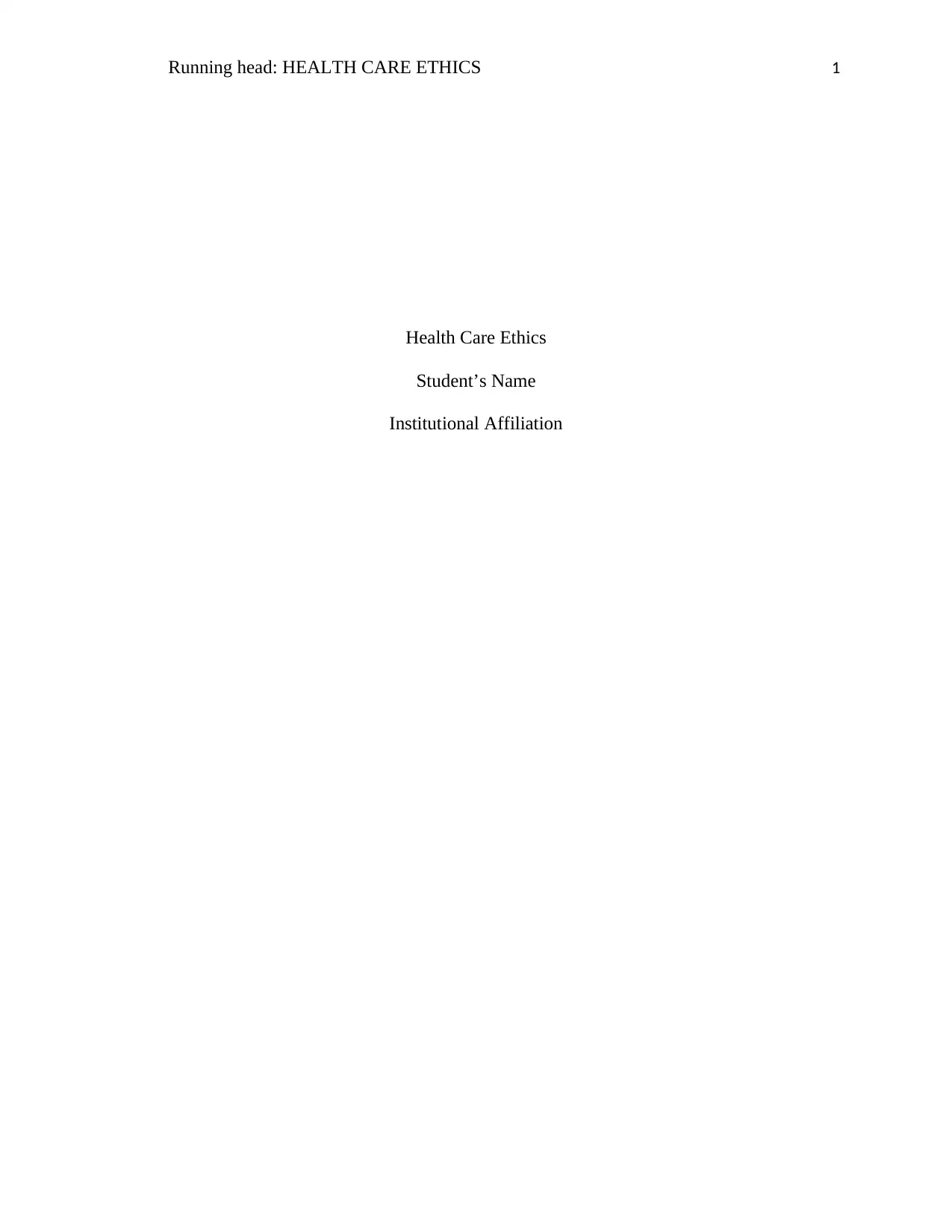
Running head: HEALTH CARE ETHICS 1
Health Care Ethics
Student’s Name
Institutional Affiliation
Health Care Ethics
Student’s Name
Institutional Affiliation
Paraphrase This Document
Need a fresh take? Get an instant paraphrase of this document with our AI Paraphraser
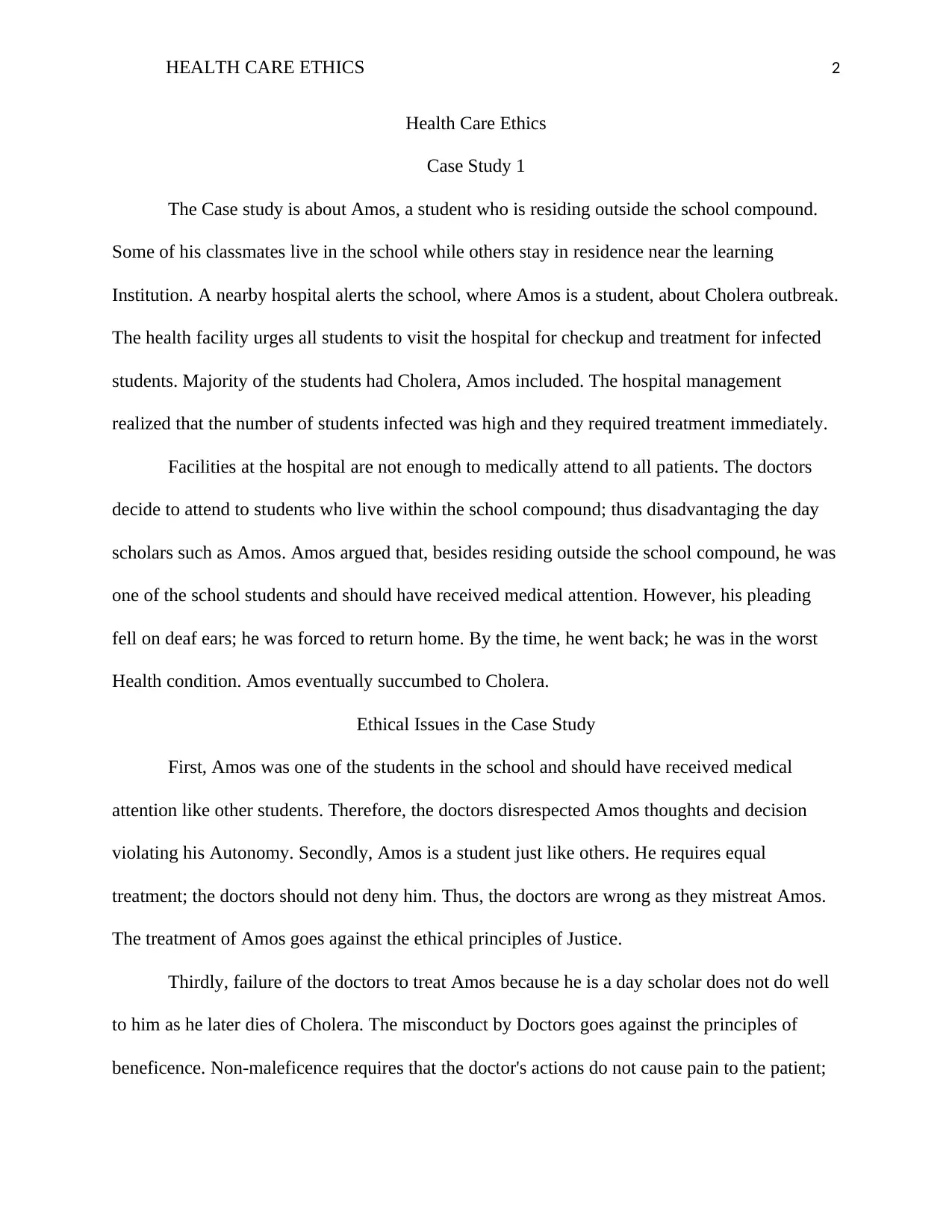
HEALTH CARE ETHICS 2
Health Care Ethics
Case Study 1
The Case study is about Amos, a student who is residing outside the school compound.
Some of his classmates live in the school while others stay in residence near the learning
Institution. A nearby hospital alerts the school, where Amos is a student, about Cholera outbreak.
The health facility urges all students to visit the hospital for checkup and treatment for infected
students. Majority of the students had Cholera, Amos included. The hospital management
realized that the number of students infected was high and they required treatment immediately.
Facilities at the hospital are not enough to medically attend to all patients. The doctors
decide to attend to students who live within the school compound; thus disadvantaging the day
scholars such as Amos. Amos argued that, besides residing outside the school compound, he was
one of the school students and should have received medical attention. However, his pleading
fell on deaf ears; he was forced to return home. By the time, he went back; he was in the worst
Health condition. Amos eventually succumbed to Cholera.
Ethical Issues in the Case Study
First, Amos was one of the students in the school and should have received medical
attention like other students. Therefore, the doctors disrespected Amos thoughts and decision
violating his Autonomy. Secondly, Amos is a student just like others. He requires equal
treatment; the doctors should not deny him. Thus, the doctors are wrong as they mistreat Amos.
The treatment of Amos goes against the ethical principles of Justice.
Thirdly, failure of the doctors to treat Amos because he is a day scholar does not do well
to him as he later dies of Cholera. The misconduct by Doctors goes against the principles of
beneficence. Non-maleficence requires that the doctor's actions do not cause pain to the patient;
Health Care Ethics
Case Study 1
The Case study is about Amos, a student who is residing outside the school compound.
Some of his classmates live in the school while others stay in residence near the learning
Institution. A nearby hospital alerts the school, where Amos is a student, about Cholera outbreak.
The health facility urges all students to visit the hospital for checkup and treatment for infected
students. Majority of the students had Cholera, Amos included. The hospital management
realized that the number of students infected was high and they required treatment immediately.
Facilities at the hospital are not enough to medically attend to all patients. The doctors
decide to attend to students who live within the school compound; thus disadvantaging the day
scholars such as Amos. Amos argued that, besides residing outside the school compound, he was
one of the school students and should have received medical attention. However, his pleading
fell on deaf ears; he was forced to return home. By the time, he went back; he was in the worst
Health condition. Amos eventually succumbed to Cholera.
Ethical Issues in the Case Study
First, Amos was one of the students in the school and should have received medical
attention like other students. Therefore, the doctors disrespected Amos thoughts and decision
violating his Autonomy. Secondly, Amos is a student just like others. He requires equal
treatment; the doctors should not deny him. Thus, the doctors are wrong as they mistreat Amos.
The treatment of Amos goes against the ethical principles of Justice.
Thirdly, failure of the doctors to treat Amos because he is a day scholar does not do well
to him as he later dies of Cholera. The misconduct by Doctors goes against the principles of
beneficence. Non-maleficence requires that the doctor's actions do not cause pain to the patient;
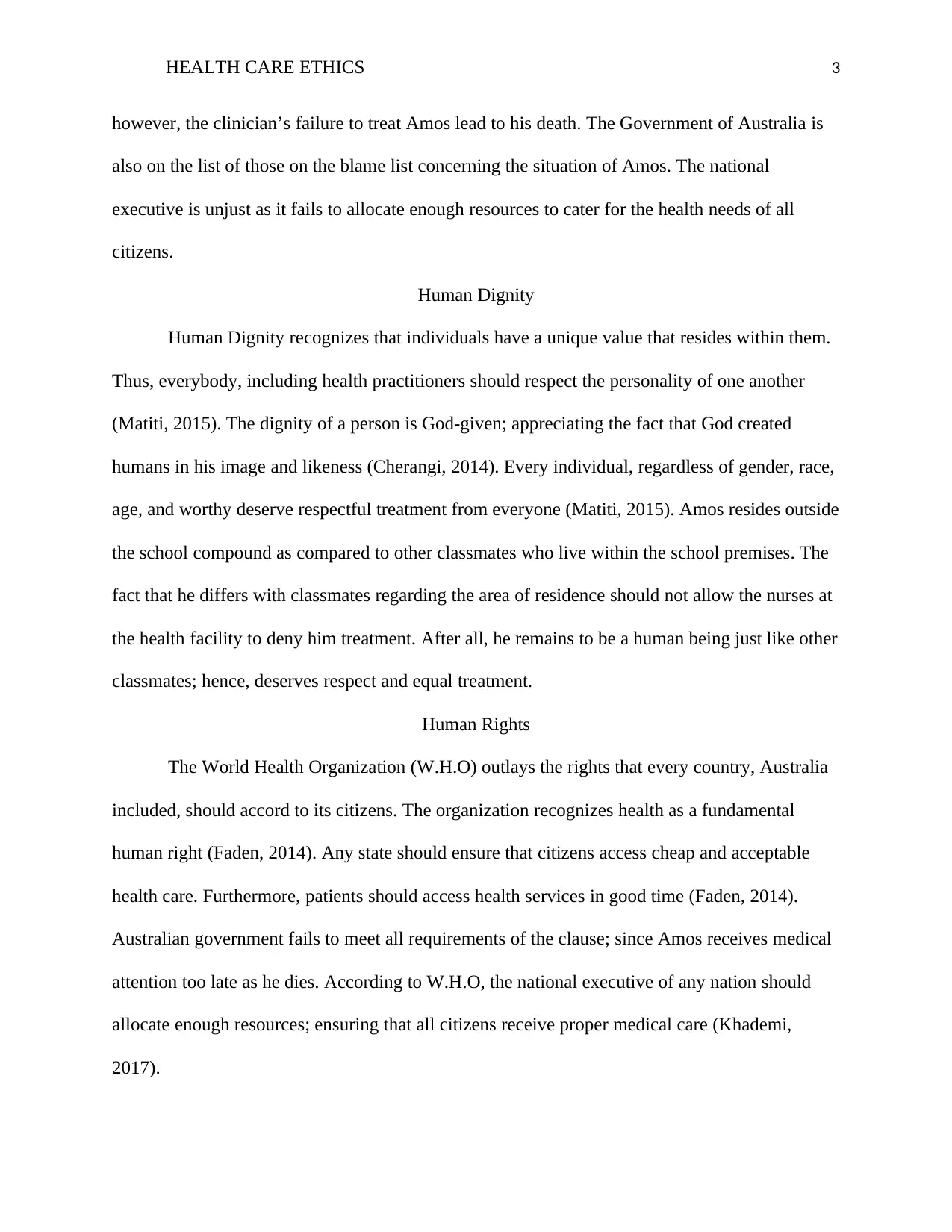
HEALTH CARE ETHICS 3
however, the clinician’s failure to treat Amos lead to his death. The Government of Australia is
also on the list of those on the blame list concerning the situation of Amos. The national
executive is unjust as it fails to allocate enough resources to cater for the health needs of all
citizens.
Human Dignity
Human Dignity recognizes that individuals have a unique value that resides within them.
Thus, everybody, including health practitioners should respect the personality of one another
(Matiti, 2015). The dignity of a person is God-given; appreciating the fact that God created
humans in his image and likeness (Cherangi, 2014). Every individual, regardless of gender, race,
age, and worthy deserve respectful treatment from everyone (Matiti, 2015). Amos resides outside
the school compound as compared to other classmates who live within the school premises. The
fact that he differs with classmates regarding the area of residence should not allow the nurses at
the health facility to deny him treatment. After all, he remains to be a human being just like other
classmates; hence, deserves respect and equal treatment.
Human Rights
The World Health Organization (W.H.O) outlays the rights that every country, Australia
included, should accord to its citizens. The organization recognizes health as a fundamental
human right (Faden, 2014). Any state should ensure that citizens access cheap and acceptable
health care. Furthermore, patients should access health services in good time (Faden, 2014).
Australian government fails to meet all requirements of the clause; since Amos receives medical
attention too late as he dies. According to W.H.O, the national executive of any nation should
allocate enough resources; ensuring that all citizens receive proper medical care (Khademi,
2017).
however, the clinician’s failure to treat Amos lead to his death. The Government of Australia is
also on the list of those on the blame list concerning the situation of Amos. The national
executive is unjust as it fails to allocate enough resources to cater for the health needs of all
citizens.
Human Dignity
Human Dignity recognizes that individuals have a unique value that resides within them.
Thus, everybody, including health practitioners should respect the personality of one another
(Matiti, 2015). The dignity of a person is God-given; appreciating the fact that God created
humans in his image and likeness (Cherangi, 2014). Every individual, regardless of gender, race,
age, and worthy deserve respectful treatment from everyone (Matiti, 2015). Amos resides outside
the school compound as compared to other classmates who live within the school premises. The
fact that he differs with classmates regarding the area of residence should not allow the nurses at
the health facility to deny him treatment. After all, he remains to be a human being just like other
classmates; hence, deserves respect and equal treatment.
Human Rights
The World Health Organization (W.H.O) outlays the rights that every country, Australia
included, should accord to its citizens. The organization recognizes health as a fundamental
human right (Faden, 2014). Any state should ensure that citizens access cheap and acceptable
health care. Furthermore, patients should access health services in good time (Faden, 2014).
Australian government fails to meet all requirements of the clause; since Amos receives medical
attention too late as he dies. According to W.H.O, the national executive of any nation should
allocate enough resources; ensuring that all citizens receive proper medical care (Khademi,
2017).
⊘ This is a preview!⊘
Do you want full access?
Subscribe today to unlock all pages.

Trusted by 1+ million students worldwide
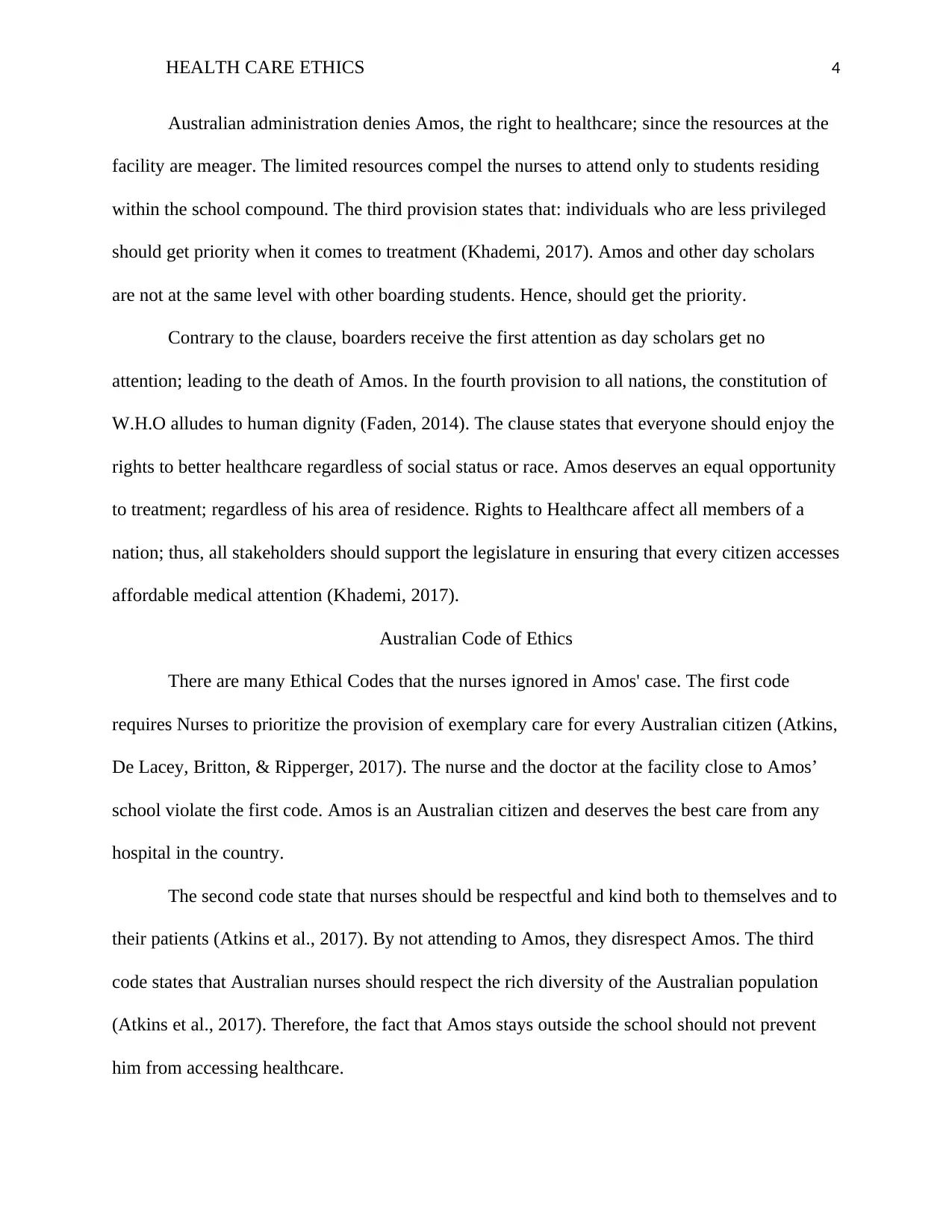
HEALTH CARE ETHICS 4
Australian administration denies Amos, the right to healthcare; since the resources at the
facility are meager. The limited resources compel the nurses to attend only to students residing
within the school compound. The third provision states that: individuals who are less privileged
should get priority when it comes to treatment (Khademi, 2017). Amos and other day scholars
are not at the same level with other boarding students. Hence, should get the priority.
Contrary to the clause, boarders receive the first attention as day scholars get no
attention; leading to the death of Amos. In the fourth provision to all nations, the constitution of
W.H.O alludes to human dignity (Faden, 2014). The clause states that everyone should enjoy the
rights to better healthcare regardless of social status or race. Amos deserves an equal opportunity
to treatment; regardless of his area of residence. Rights to Healthcare affect all members of a
nation; thus, all stakeholders should support the legislature in ensuring that every citizen accesses
affordable medical attention (Khademi, 2017).
Australian Code of Ethics
There are many Ethical Codes that the nurses ignored in Amos' case. The first code
requires Nurses to prioritize the provision of exemplary care for every Australian citizen (Atkins,
De Lacey, Britton, & Ripperger, 2017). The nurse and the doctor at the facility close to Amos’
school violate the first code. Amos is an Australian citizen and deserves the best care from any
hospital in the country.
The second code state that nurses should be respectful and kind both to themselves and to
their patients (Atkins et al., 2017). By not attending to Amos, they disrespect Amos. The third
code states that Australian nurses should respect the rich diversity of the Australian population
(Atkins et al., 2017). Therefore, the fact that Amos stays outside the school should not prevent
him from accessing healthcare.
Australian administration denies Amos, the right to healthcare; since the resources at the
facility are meager. The limited resources compel the nurses to attend only to students residing
within the school compound. The third provision states that: individuals who are less privileged
should get priority when it comes to treatment (Khademi, 2017). Amos and other day scholars
are not at the same level with other boarding students. Hence, should get the priority.
Contrary to the clause, boarders receive the first attention as day scholars get no
attention; leading to the death of Amos. In the fourth provision to all nations, the constitution of
W.H.O alludes to human dignity (Faden, 2014). The clause states that everyone should enjoy the
rights to better healthcare regardless of social status or race. Amos deserves an equal opportunity
to treatment; regardless of his area of residence. Rights to Healthcare affect all members of a
nation; thus, all stakeholders should support the legislature in ensuring that every citizen accesses
affordable medical attention (Khademi, 2017).
Australian Code of Ethics
There are many Ethical Codes that the nurses ignored in Amos' case. The first code
requires Nurses to prioritize the provision of exemplary care for every Australian citizen (Atkins,
De Lacey, Britton, & Ripperger, 2017). The nurse and the doctor at the facility close to Amos’
school violate the first code. Amos is an Australian citizen and deserves the best care from any
hospital in the country.
The second code state that nurses should be respectful and kind both to themselves and to
their patients (Atkins et al., 2017). By not attending to Amos, they disrespect Amos. The third
code states that Australian nurses should respect the rich diversity of the Australian population
(Atkins et al., 2017). Therefore, the fact that Amos stays outside the school should not prevent
him from accessing healthcare.
Paraphrase This Document
Need a fresh take? Get an instant paraphrase of this document with our AI Paraphraser
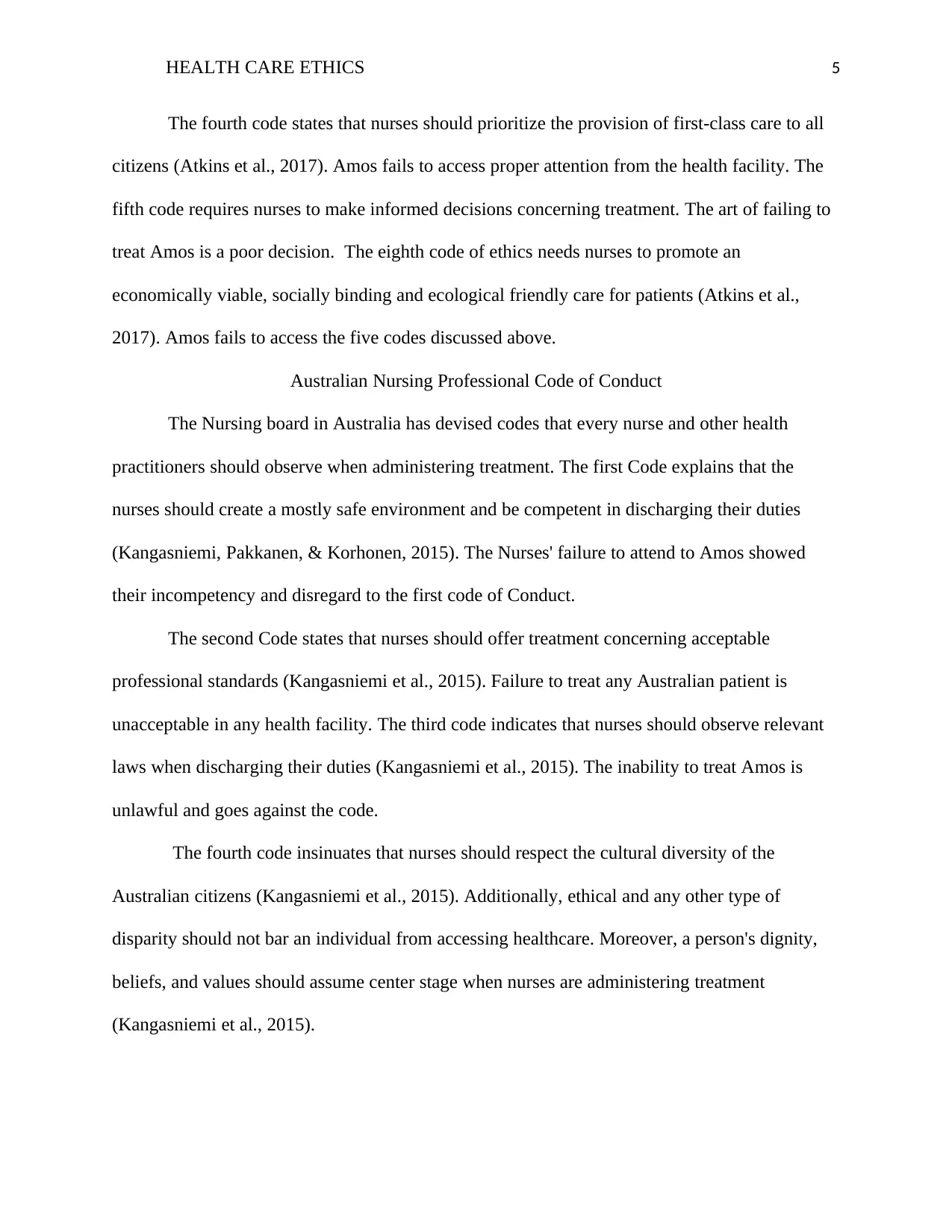
HEALTH CARE ETHICS 5
The fourth code states that nurses should prioritize the provision of first-class care to all
citizens (Atkins et al., 2017). Amos fails to access proper attention from the health facility. The
fifth code requires nurses to make informed decisions concerning treatment. The art of failing to
treat Amos is a poor decision. The eighth code of ethics needs nurses to promote an
economically viable, socially binding and ecological friendly care for patients (Atkins et al.,
2017). Amos fails to access the five codes discussed above.
Australian Nursing Professional Code of Conduct
The Nursing board in Australia has devised codes that every nurse and other health
practitioners should observe when administering treatment. The first Code explains that the
nurses should create a mostly safe environment and be competent in discharging their duties
(Kangasniemi, Pakkanen, & Korhonen, 2015). The Nurses' failure to attend to Amos showed
their incompetency and disregard to the first code of Conduct.
The second Code states that nurses should offer treatment concerning acceptable
professional standards (Kangasniemi et al., 2015). Failure to treat any Australian patient is
unacceptable in any health facility. The third code indicates that nurses should observe relevant
laws when discharging their duties (Kangasniemi et al., 2015). The inability to treat Amos is
unlawful and goes against the code.
The fourth code insinuates that nurses should respect the cultural diversity of the
Australian citizens (Kangasniemi et al., 2015). Additionally, ethical and any other type of
disparity should not bar an individual from accessing healthcare. Moreover, a person's dignity,
beliefs, and values should assume center stage when nurses are administering treatment
(Kangasniemi et al., 2015).
The fourth code states that nurses should prioritize the provision of first-class care to all
citizens (Atkins et al., 2017). Amos fails to access proper attention from the health facility. The
fifth code requires nurses to make informed decisions concerning treatment. The art of failing to
treat Amos is a poor decision. The eighth code of ethics needs nurses to promote an
economically viable, socially binding and ecological friendly care for patients (Atkins et al.,
2017). Amos fails to access the five codes discussed above.
Australian Nursing Professional Code of Conduct
The Nursing board in Australia has devised codes that every nurse and other health
practitioners should observe when administering treatment. The first Code explains that the
nurses should create a mostly safe environment and be competent in discharging their duties
(Kangasniemi, Pakkanen, & Korhonen, 2015). The Nurses' failure to attend to Amos showed
their incompetency and disregard to the first code of Conduct.
The second Code states that nurses should offer treatment concerning acceptable
professional standards (Kangasniemi et al., 2015). Failure to treat any Australian patient is
unacceptable in any health facility. The third code indicates that nurses should observe relevant
laws when discharging their duties (Kangasniemi et al., 2015). The inability to treat Amos is
unlawful and goes against the code.
The fourth code insinuates that nurses should respect the cultural diversity of the
Australian citizens (Kangasniemi et al., 2015). Additionally, ethical and any other type of
disparity should not bar an individual from accessing healthcare. Moreover, a person's dignity,
beliefs, and values should assume center stage when nurses are administering treatment
(Kangasniemi et al., 2015).
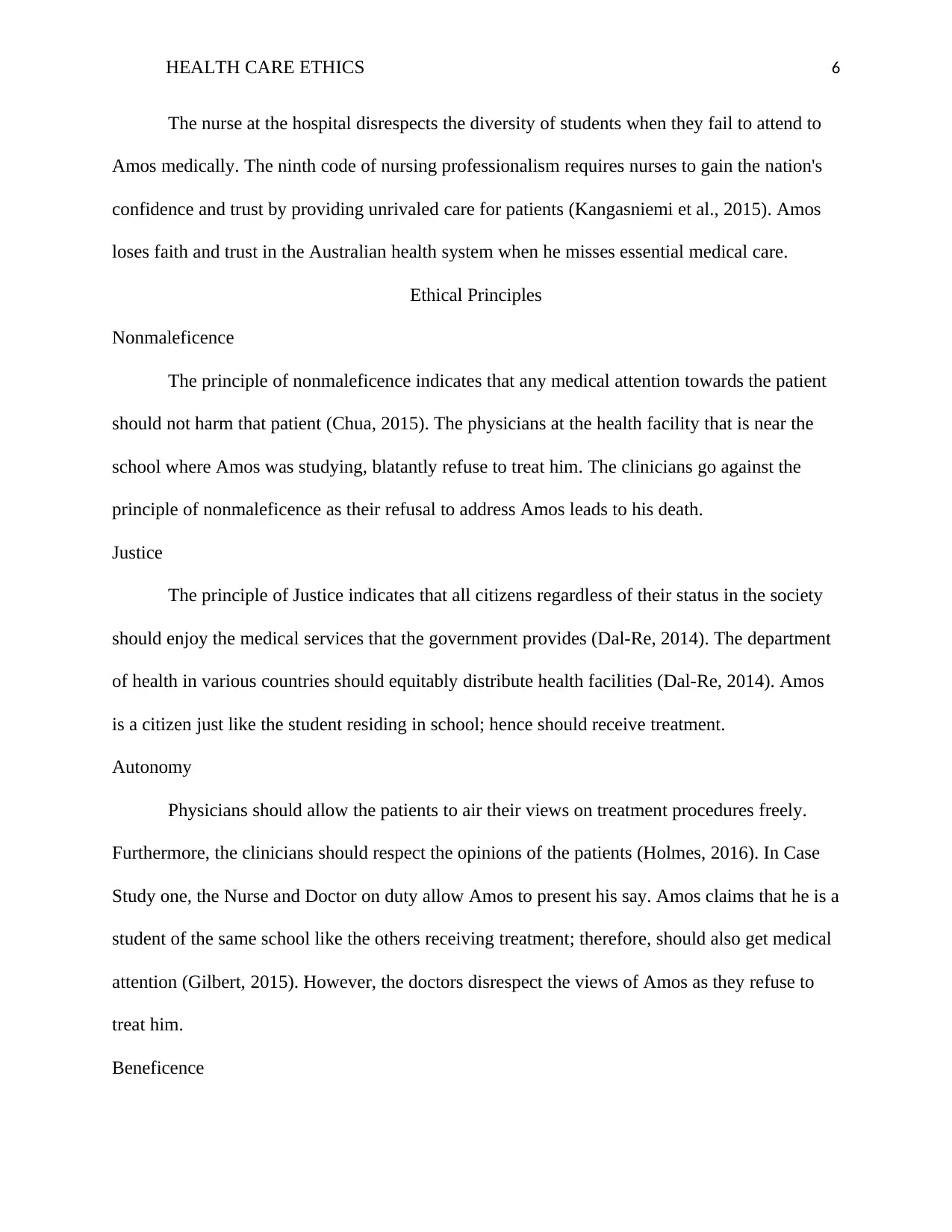
HEALTH CARE ETHICS 6
The nurse at the hospital disrespects the diversity of students when they fail to attend to
Amos medically. The ninth code of nursing professionalism requires nurses to gain the nation's
confidence and trust by providing unrivaled care for patients (Kangasniemi et al., 2015). Amos
loses faith and trust in the Australian health system when he misses essential medical care.
Ethical Principles
Nonmaleficence
The principle of nonmaleficence indicates that any medical attention towards the patient
should not harm that patient (Chua, 2015). The physicians at the health facility that is near the
school where Amos was studying, blatantly refuse to treat him. The clinicians go against the
principle of nonmaleficence as their refusal to address Amos leads to his death.
Justice
The principle of Justice indicates that all citizens regardless of their status in the society
should enjoy the medical services that the government provides (Dal-Re, 2014). The department
of health in various countries should equitably distribute health facilities (Dal-Re, 2014). Amos
is a citizen just like the student residing in school; hence should receive treatment.
Autonomy
Physicians should allow the patients to air their views on treatment procedures freely.
Furthermore, the clinicians should respect the opinions of the patients (Holmes, 2016). In Case
Study one, the Nurse and Doctor on duty allow Amos to present his say. Amos claims that he is a
student of the same school like the others receiving treatment; therefore, should also get medical
attention (Gilbert, 2015). However, the doctors disrespect the views of Amos as they refuse to
treat him.
Beneficence
The nurse at the hospital disrespects the diversity of students when they fail to attend to
Amos medically. The ninth code of nursing professionalism requires nurses to gain the nation's
confidence and trust by providing unrivaled care for patients (Kangasniemi et al., 2015). Amos
loses faith and trust in the Australian health system when he misses essential medical care.
Ethical Principles
Nonmaleficence
The principle of nonmaleficence indicates that any medical attention towards the patient
should not harm that patient (Chua, 2015). The physicians at the health facility that is near the
school where Amos was studying, blatantly refuse to treat him. The clinicians go against the
principle of nonmaleficence as their refusal to address Amos leads to his death.
Justice
The principle of Justice indicates that all citizens regardless of their status in the society
should enjoy the medical services that the government provides (Dal-Re, 2014). The department
of health in various countries should equitably distribute health facilities (Dal-Re, 2014). Amos
is a citizen just like the student residing in school; hence should receive treatment.
Autonomy
Physicians should allow the patients to air their views on treatment procedures freely.
Furthermore, the clinicians should respect the opinions of the patients (Holmes, 2016). In Case
Study one, the Nurse and Doctor on duty allow Amos to present his say. Amos claims that he is a
student of the same school like the others receiving treatment; therefore, should also get medical
attention (Gilbert, 2015). However, the doctors disrespect the views of Amos as they refuse to
treat him.
Beneficence
⊘ This is a preview!⊘
Do you want full access?
Subscribe today to unlock all pages.

Trusted by 1+ million students worldwide
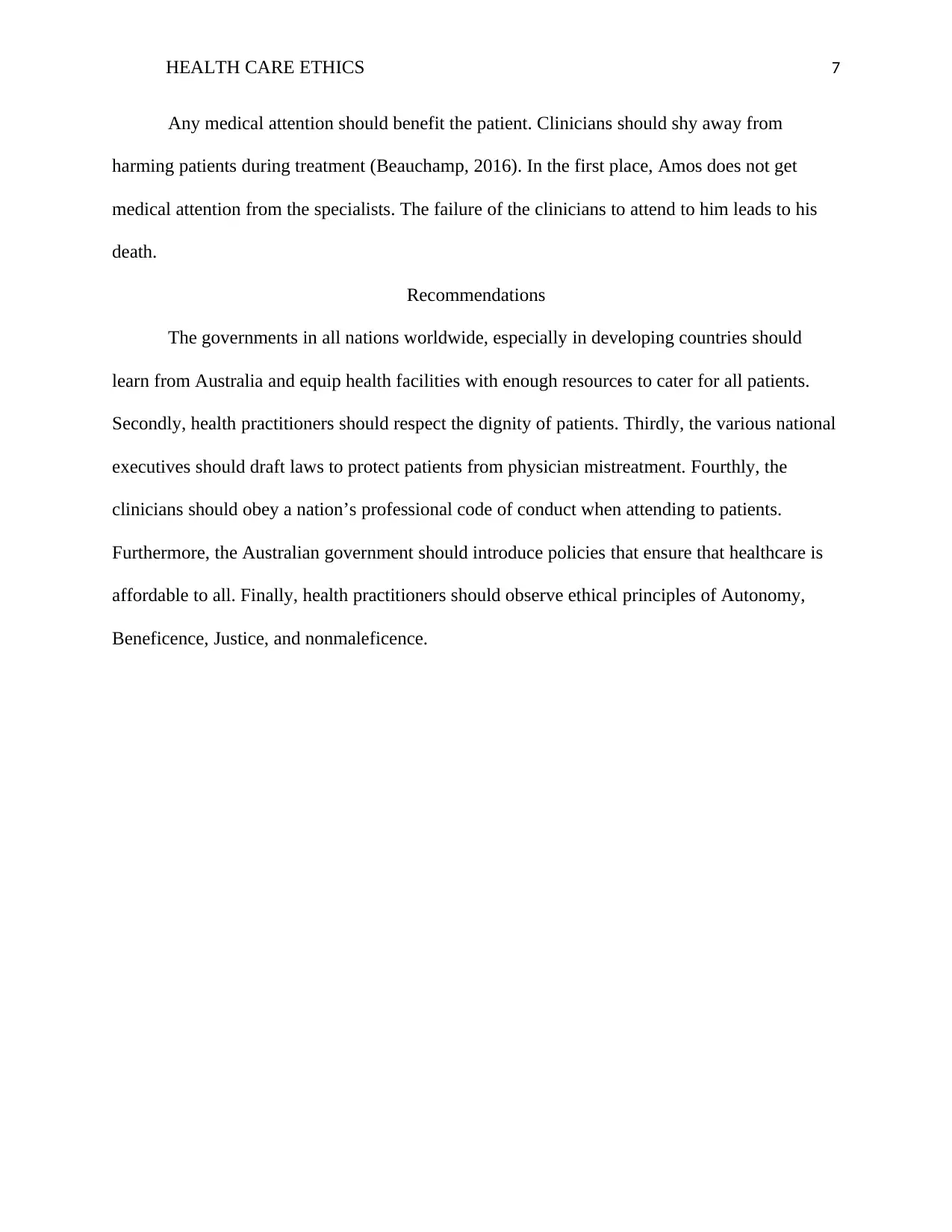
HEALTH CARE ETHICS 7
Any medical attention should benefit the patient. Clinicians should shy away from
harming patients during treatment (Beauchamp, 2016). In the first place, Amos does not get
medical attention from the specialists. The failure of the clinicians to attend to him leads to his
death.
Recommendations
The governments in all nations worldwide, especially in developing countries should
learn from Australia and equip health facilities with enough resources to cater for all patients.
Secondly, health practitioners should respect the dignity of patients. Thirdly, the various national
executives should draft laws to protect patients from physician mistreatment. Fourthly, the
clinicians should obey a nation’s professional code of conduct when attending to patients.
Furthermore, the Australian government should introduce policies that ensure that healthcare is
affordable to all. Finally, health practitioners should observe ethical principles of Autonomy,
Beneficence, Justice, and nonmaleficence.
Any medical attention should benefit the patient. Clinicians should shy away from
harming patients during treatment (Beauchamp, 2016). In the first place, Amos does not get
medical attention from the specialists. The failure of the clinicians to attend to him leads to his
death.
Recommendations
The governments in all nations worldwide, especially in developing countries should
learn from Australia and equip health facilities with enough resources to cater for all patients.
Secondly, health practitioners should respect the dignity of patients. Thirdly, the various national
executives should draft laws to protect patients from physician mistreatment. Fourthly, the
clinicians should obey a nation’s professional code of conduct when attending to patients.
Furthermore, the Australian government should introduce policies that ensure that healthcare is
affordable to all. Finally, health practitioners should observe ethical principles of Autonomy,
Beneficence, Justice, and nonmaleficence.
Paraphrase This Document
Need a fresh take? Get an instant paraphrase of this document with our AI Paraphraser
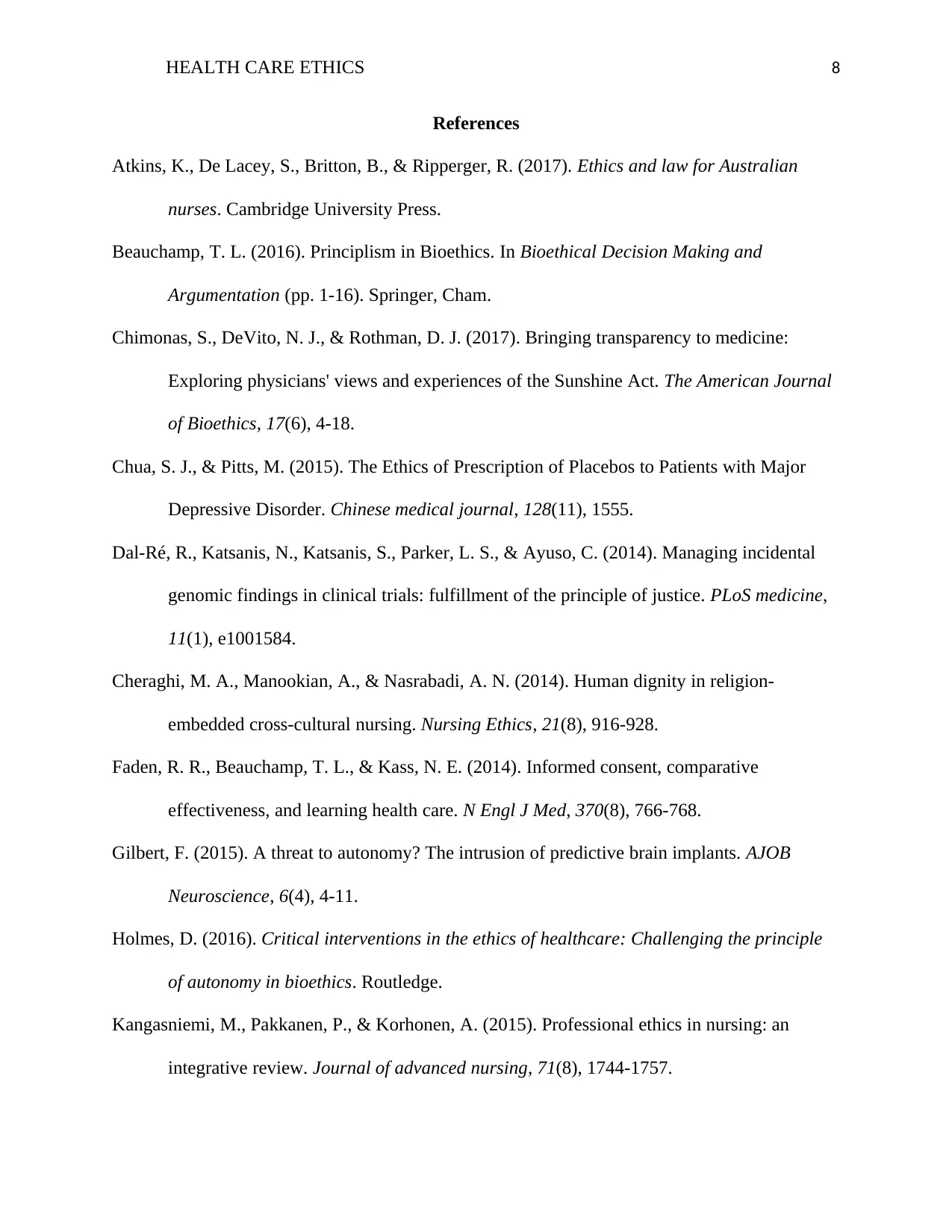
HEALTH CARE ETHICS 8
References
Atkins, K., De Lacey, S., Britton, B., & Ripperger, R. (2017). Ethics and law for Australian
nurses. Cambridge University Press.
Beauchamp, T. L. (2016). Principlism in Bioethics. In Bioethical Decision Making and
Argumentation (pp. 1-16). Springer, Cham.
Chimonas, S., DeVito, N. J., & Rothman, D. J. (2017). Bringing transparency to medicine:
Exploring physicians' views and experiences of the Sunshine Act. The American Journal
of Bioethics, 17(6), 4-18.
Chua, S. J., & Pitts, M. (2015). The Ethics of Prescription of Placebos to Patients with Major
Depressive Disorder. Chinese medical journal, 128(11), 1555.
Dal-Ré, R., Katsanis, N., Katsanis, S., Parker, L. S., & Ayuso, C. (2014). Managing incidental
genomic findings in clinical trials: fulfillment of the principle of justice. PLoS medicine,
11(1), e1001584.
Cheraghi, M. A., Manookian, A., & Nasrabadi, A. N. (2014). Human dignity in religion-
embedded cross-cultural nursing. Nursing Ethics, 21(8), 916-928.
Faden, R. R., Beauchamp, T. L., & Kass, N. E. (2014). Informed consent, comparative
effectiveness, and learning health care. N Engl J Med, 370(8), 766-768.
Gilbert, F. (2015). A threat to autonomy? The intrusion of predictive brain implants. AJOB
Neuroscience, 6(4), 4-11.
Holmes, D. (2016). Critical interventions in the ethics of healthcare: Challenging the principle
of autonomy in bioethics. Routledge.
Kangasniemi, M., Pakkanen, P., & Korhonen, A. (2015). Professional ethics in nursing: an
integrative review. Journal of advanced nursing, 71(8), 1744-1757.
References
Atkins, K., De Lacey, S., Britton, B., & Ripperger, R. (2017). Ethics and law for Australian
nurses. Cambridge University Press.
Beauchamp, T. L. (2016). Principlism in Bioethics. In Bioethical Decision Making and
Argumentation (pp. 1-16). Springer, Cham.
Chimonas, S., DeVito, N. J., & Rothman, D. J. (2017). Bringing transparency to medicine:
Exploring physicians' views and experiences of the Sunshine Act. The American Journal
of Bioethics, 17(6), 4-18.
Chua, S. J., & Pitts, M. (2015). The Ethics of Prescription of Placebos to Patients with Major
Depressive Disorder. Chinese medical journal, 128(11), 1555.
Dal-Ré, R., Katsanis, N., Katsanis, S., Parker, L. S., & Ayuso, C. (2014). Managing incidental
genomic findings in clinical trials: fulfillment of the principle of justice. PLoS medicine,
11(1), e1001584.
Cheraghi, M. A., Manookian, A., & Nasrabadi, A. N. (2014). Human dignity in religion-
embedded cross-cultural nursing. Nursing Ethics, 21(8), 916-928.
Faden, R. R., Beauchamp, T. L., & Kass, N. E. (2014). Informed consent, comparative
effectiveness, and learning health care. N Engl J Med, 370(8), 766-768.
Gilbert, F. (2015). A threat to autonomy? The intrusion of predictive brain implants. AJOB
Neuroscience, 6(4), 4-11.
Holmes, D. (2016). Critical interventions in the ethics of healthcare: Challenging the principle
of autonomy in bioethics. Routledge.
Kangasniemi, M., Pakkanen, P., & Korhonen, A. (2015). Professional ethics in nursing: an
integrative review. Journal of advanced nursing, 71(8), 1744-1757.
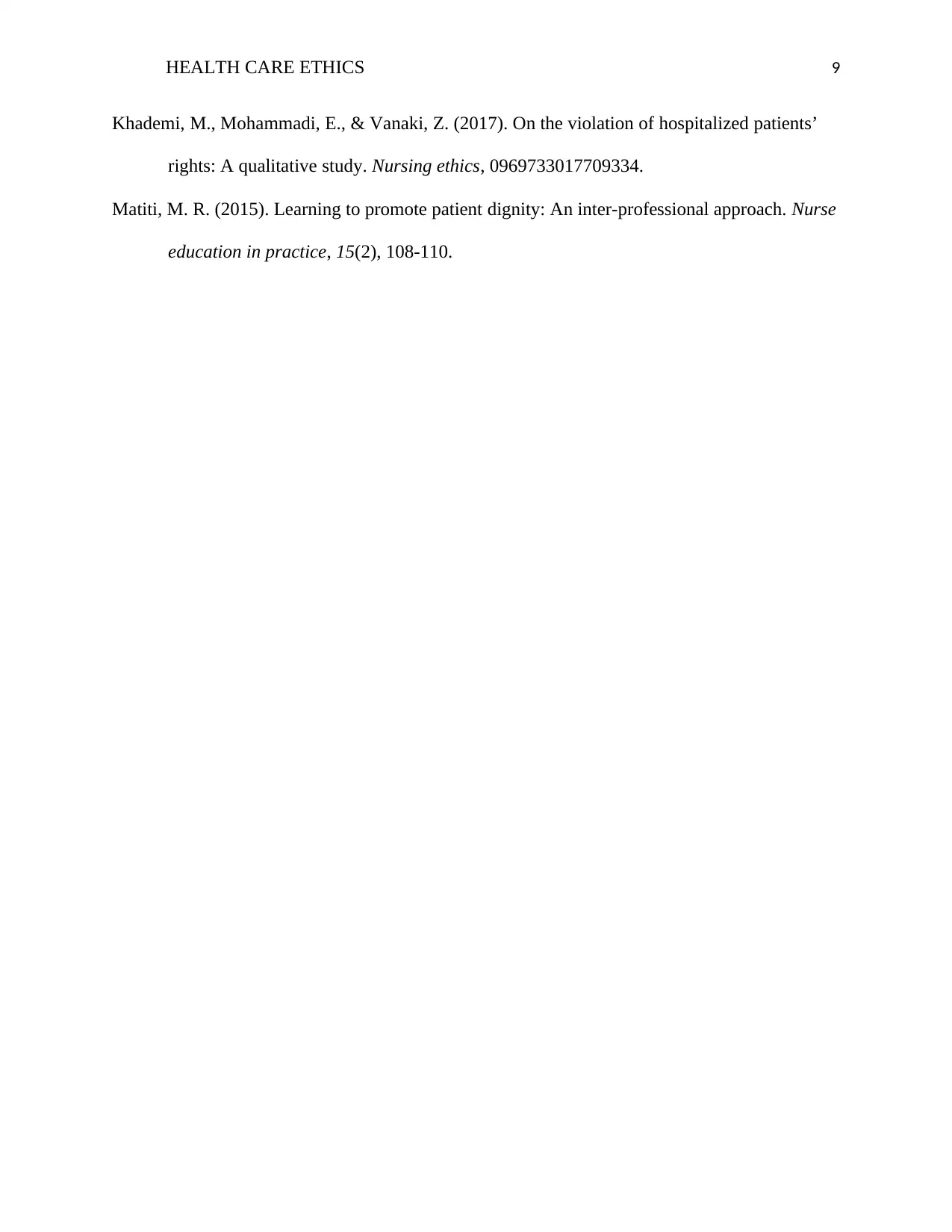
HEALTH CARE ETHICS 9
Khademi, M., Mohammadi, E., & Vanaki, Z. (2017). On the violation of hospitalized patients’
rights: A qualitative study. Nursing ethics, 0969733017709334.
Matiti, M. R. (2015). Learning to promote patient dignity: An inter-professional approach. Nurse
education in practice, 15(2), 108-110.
Khademi, M., Mohammadi, E., & Vanaki, Z. (2017). On the violation of hospitalized patients’
rights: A qualitative study. Nursing ethics, 0969733017709334.
Matiti, M. R. (2015). Learning to promote patient dignity: An inter-professional approach. Nurse
education in practice, 15(2), 108-110.
⊘ This is a preview!⊘
Do you want full access?
Subscribe today to unlock all pages.

Trusted by 1+ million students worldwide
1 out of 9
Related Documents
Your All-in-One AI-Powered Toolkit for Academic Success.
+13062052269
info@desklib.com
Available 24*7 on WhatsApp / Email
![[object Object]](/_next/static/media/star-bottom.7253800d.svg)
Unlock your academic potential
Copyright © 2020–2026 A2Z Services. All Rights Reserved. Developed and managed by ZUCOL.





